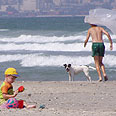
That would let them move freely on the Sabbath, when they are traditionally forbidden from going outside with anything in hand — including keys, a wallet or even a child.
The obstacle: California law calls for the protection of public views along the coast and the habitats of nesting shore birds.
'Major social inconvenience'
Orthodox Jews cannot do work or certain physical tasks outside the home on their day of rest and prayer, which begins at sundown Friday and ends at nightfall Saturday. The restrictions include carrying objects or pushing strollers and wheelchairs.
"It's a major social inconvenience," said Lea Geller, who dreads spending Saturdays indoors with her newborn while her family walks to pray at the Pacific Jewish Center.
Efforts to enclose much of Santa Monica, Venice and Marina del Rey began in 2002. The final step would be linking about four miles of beachfront and an inland area to the current eight-mile patchwork of chain-link fences or walls along the freeways and major roads.
Completing the eruv along the coast would entail stringing 200-pound-test fishing line between lamp posts and 20-foot steel poles extending above 19 welcome-to-the-beach signs.
The California Coastal Commission is expected to decide on the USD 20,000 proposal next month.
Nationwide controversies
Controversy often follows eruvs, more than 100 of which wind through major cities including Los Angeles and New York.
Last month, San Diego officials approved an eruv despite concerns that public property should not be used for religious purposes. In 2003, the Supreme Court declined to hear a case in which a federal appeals court ruled that removing eruv markers in a New Jersey neighborhood likely violated the right to exercise religious beliefs.
In cities and suburbs, the fishing line is typically strung between telephone poles and is all but invisible. This eruv by the beach would offer new twists.
Mind the birds
Where the line would approach a nesting area of up to dozens of endangered California least terns, organizers propose hanging reflective streamers so the birds wouldn't run into it.
The small, black-capped birds suffered a dramatic decline when the Pacific Coast Highway was built and the species was deemed endangered in 1970. Since then, nesting sites have been protected.
The man overseeing the eruv project, Howard Shapiro, said he didn't know about the nesting colony.
"We don't want to kill birds or anything like that," he said.
Some residents and environmentalists remain concerned.
"This is really nuts," said Mark Massara, director of the Sierra Club's California Coastal Program. "To the extent that we're allowing public property to be used for religious purposes is very troublesome."
In a letter to the Coastal Commission, Marina del Rey resident Plinio J. Garcia pointedly suggested using the Christian cross or the Muslim crescent moon instead of the galvanized poles to string the fishing line.
"The birds would see those just as well," Garcia wrote. "See where I am going with this? It opens up an entire assortment of problems, which the poor least terns should not be victimized for."
What about boy in wheelchair?
The Jewish group says it needs the eruv to keep young families in the area, which in the 1940s hosted a thriving Orthodox community. Some families have left citing the difficulty of having no enclosure, said Rabbi Ben Geiger.
"We have a family with a child in a wheelchair and it's not just getting to synagogue for her, it's getting outdoors," he said. "It is a terrible thing for an 8-year-old."
Organizers have worked with an environmental consultant and Coastal Commission staff, which at first recommended denying the project. Proposals include painting the poles to make them less noticeable, not running the fishing line in front of residents' windows and attaching the reflective flags to alert the birds at street ends.
Coastal Commission staff are considering approving the eruv for a three-year trial, said Peter Douglas, executive director of the Coastal Commission.
"We try and accommodate religious practices any way we can," he said. "It's just that we have a balancing act to do, taking into account other public interests including wildlife impacts."















